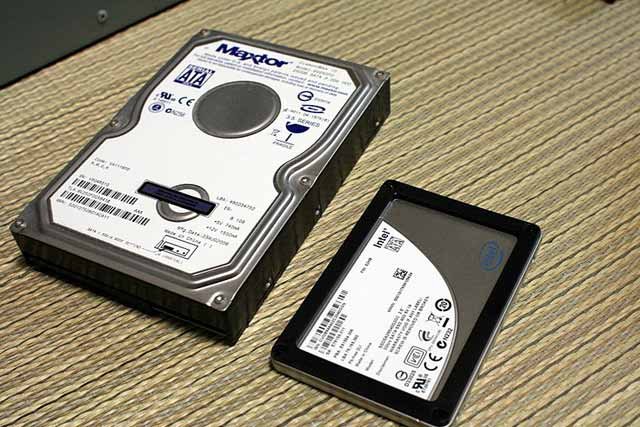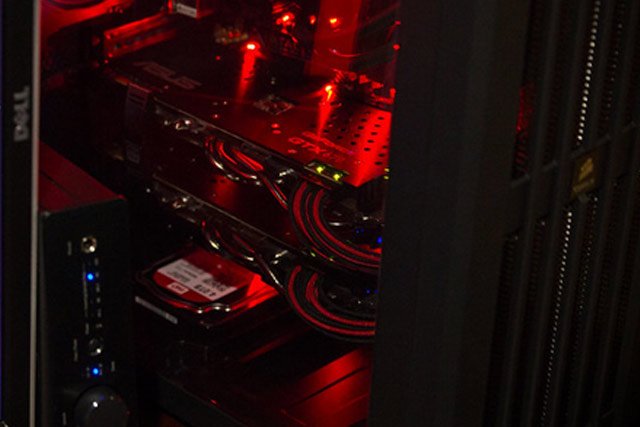Modern technology typically leaves no room for competition. So is not the case with the SSD vs HDD theory. Even though SSDs are much a faster storage option than a traditional HDD, the old hard drives are putting up a fight. Our guide below will discuss the critical differences between SSD and HDD based on speed, capacity, reliability, and cost.
Whether you’re a gamer, a heavy-load user, or an efficient daily user, the choice between SSD and HDD always comes down to preferences. You may want to stick to a hard drive’s nostalgic capacity, upgrade to an SSD for speed, or even use a hybrid storage system.
But before marking the difference between SSD and HDD, let’s get an overview of both storage devices!
Solid State Drive (SSD) vs. Hard Disk Drive (HDD): What They Are?
Solid State Drive and Hard Disk Drives are both storage options for computers, laptops, and tablets. While the former boasts incredible speed and durability, the latter emphasizes storage capacity. Here’s an in-depth description of how each one of these storage drives works.
What Is a Solid State Drive (SSD)?

As the name suggests, a solid-state drive has no moving parts as its predecessor. And that makes an SSD lighter, faster, and portable for slim devices. Its size can shrink as much as a stamp due to the M.2 form factor.
SSD stands for Solid State Drive and is becoming the primary storage option for many new devices since its official introduction in the early 2000s. The latest MacBook is taking the lead by not supporting an old hard disk drive format at all. Even though many cheaper options still pack an old-school hard drive, you’ll likely come by such options only if you’re on a budget.
The SSD fits into the SATA III (Latest SATA Connection Form-Factor) port on the motherboard. However, to avoid choking its lightning-fast speeds, a PCIe slot is preferred in newer devices. Modern technology enables SSDs to perform much better in speed than mechanical tape and arm. And that’s probably what makes them a comparatively expensive choice.
What Is a Hard Disk Drive (HDD)?

HDD stands for Hard Disk Drives, and they have a legacy in technology that has been in mass use since the 60s. Although the sizes have shrunk dramatically from two-commercial-refrigerator spaces to 2.5 inches of thickness, they still rely on the same old mechanics.
There are two main working components on a hard drive: the magnetic disk (circular disk) and the arm. The magnetic disk spins and the mechanical arm hovers over it to read and write data. Since it requires mechanical activity to read and write data, a hard drive’s speed depends on how many rounds it makes per minute.
Newer hard drives use the SATA III port on the motherboard, while some older versions still use the IDE port. If you have an older laptop or a desktop PC, you will likely have a hard disk drive as your storage option.
SSD vs. HDD: Comparison
The difference between SSD and HDD is not quite visible to the average user that has little need for speed. However, if you’re a tech enthusiast, the following few differences are unlikely to go unnoticed by you!
Speed:
Speed comes naturally to SSD because of its electric-circuitry-based design instead of a mechanical one. An average mid-range SSD can be ten times or even faster than an average or mid-range HDD.
Firstly, this is so because of the absence of moving parts in an SSD when reading or writing data. And secondly, because of the motherboard form factors or the ports they use. The standard SATA III port is plenty enough for an HDD but limits an SSD’s speed as it can perform much faster.
But as we now see with the new PCIe ports, how fast SSDs can be, such speed is not always a requirement for an average user.
HDD Top Speed: 100 MB/s at 5,400 RPM (Mid-Range), 150 MB/s at 7,200 RPM (Premium-Range)
SSD Top Speed: 600 MB/s on SATA III ports, 1.2-1.4 GB/s on PCIe or M.2 ports.
There are more factors than just the storage device that determines your computer’s speed. Read here to find out what else might be slowing your computer and how to resolve the problem.
Reliability and Durability:

When the concept of Flash Memory first emerged in the latter half of the last century, it wasn’t considered much reliable. But as modern technology advances, these concepts of bubble memory have proven much more reliable.
While both storage options are subject to wear and tear from excessive use, their reliability doesn’t stand far apart. However, durability plays a vital role in separating the two.
Since SSDs have no moving parts, they are very resistant to your device’s shock and aggressive use. The same cannot be said for hard drives, as they prove to be more fragile. The read-and-write arm is only a few nanometers away from the magnetic disk when you’ve powered your computer, and a drop may cause severe damage to your data.
So, if you’re an on-the-go user who doesn’t stop to shut a laptop down before throwing it in the bag and walking out, you’re better off with an SSD.
Noise, Power, and Lifespan
It is easy to understand the power requirements and noise emission based on mechanics. Anything mechanical, no matter how efficient, will always have some extent of noise emission. On a hard drive, the magnetic plate platter spins at high speeds while the arm moves up and down to read or write data. Spinning the disk up from a standstill requires more power. Also, the faster hard drives spinning the tape much more rapidly tend to make more noise.
On the contrary, an SSD makes no noise at all. Since there is no mechanical moving part, there is no wasted power either. SSDs consume much lesser power than HDDs, which can be seen from how exceptionally lasting new laptops are on batteries.
The longevity of both storage devices is highly subjective. Indeed, you can only write and erase data on a cell of flash memory a number of times. But you’re very unlikely to reach that number with average use over the years. However, HDDs, too, are subject to damage and become inefficient over time due to damage or fragmentation.
Price and Capacities
The capacity of storage devices is very closely tied to its price. Normally, an SSD is more expensive than an HDD, but there still are exceptions to that. While there is no doubt about an SSD being more expensive per GB than an HDD, you can get the older SSDs with SATA III ports much cheaper.
You typically come across SSDs varying from 500 GB to 2 TB used as primary drives for devices. But the maximum capacity can reach as far up as 8 TB. On the contrary, an HDD offers much more versatility in capacity by hitting a maximum of 14 TB.
A mid-range HDD costs somewhere between $120-$160, while an SSD price starts from around $200.
Again, the difference is massive, but not the common user. If you’re frequently storing and accessing large chunks of data on your PC, then an SSD is the surest way to go. But if you don’t frequently access stored data, choosing an HDD can leave you the extra room to upgrade your computer’s hardware when on a budget.
How to Use SSD and HDD Together?

Ever since the introduction of SSDs, there have been many attempts to merge speedy sticks with affordability. And that’s what gave us the Hybrid Storage Options in the mid-2000s. Hybrid storage is chipping flash memory on an HDD so that the basic functions are taken over to the flash memory. You get speed on a budget with a large storage capacity as well.
However, as SSD technology is expanding and becoming more familiar, so are the prices dropping. Nowadays, Hybrid storage is nearly extinct due to the low prices of some low-end SSDs.
A more popular way now for storage is to use both storage devices at the same time. You connect an SSD via a PCIe port while a hard drive through the SATA III port. Setting up SSD as your primary drive option will speed up your computer’s boot time, app launch time, and multitasking. And to have a large storage capacity, you have your HDD as a secondary storage option.
SSD vs. HDD for Gamers

Accessing large amounts of data is a common routine for games. Games need to access mods, visual files, audio, maps, and textures when loading or booting up. And speed here can make a massive difference in the gaming experience.
While the best SSD for gaming is costlier, it is definitely not an easy choice for gamers. But for games where you have storage data of nearly 100 GBs, it definitely makes a difference in loading time. Where an HDD takes 3-4 minutes to load a game, an SSD can do it well under a minute.
Struggling to get a little more speed out of your computer for games? Overclocking your GPU will significantly improve the speed of your games and boost FPS.
How To Move Files From SSD to HDD?

Moving files from SSD to HDD when you’re running both storage devices is as simple as moving files from one drive to another. However, if you don’t have an HDD connected to your laptop, you might be using it as an external drive.
In this case, you need admin access and permission to move system files.
Caution: Moving system files may cause your PC to be corrupt!
As an SSD is mainly used as primary Drive C in most setups, you won’t move all files to HDD on another drive. However, you can follow the following steps to move your Documents, Music, Pictures, Videos, and Desktop folder:
- 1st Step: Open the File Explorer
- 2nd Step: At the top-left of the screen, right-click the documents folder and select properties
- 3rd Step: Navigate to the Location tab at the top
- 4th Step: Change the location of the folder by typing, e.g., “D:\Documents”
Doing so will move all your documents to your HDD on Drive D.
SSD vs HDD: The Bottom-line
| HDD | SDD | |
| Price | $40-60 (1TB) | $100< (1TB) |
| Speed | 80-160 MB/s @ 7200 RPM | 200-550 MB/s (3500 MB/s max) |
| Durability | Fragile, movement can cause damage. | No moving parts, less risk of damage. |
| Maximum Capacity | 18TB ( Seagate IronWold Pro ) | 100TB ( Nimbus Data Exadrive ) |
| Power Usage | More mechanical movement, more power consumption. | No mechanical movement, less power consumption. |
SSD clearly comes out on top if it weren’t for the low price and longevity of the HDD. Before you make your final decision for SSD vs. HDD, you must identify the type of data you’ll be dealing with. If your data storage requirements fit the bill of an HDD, go with that!
But, if going a bit over your budget isn’t your primary concern, an SSD can offer much more value.





